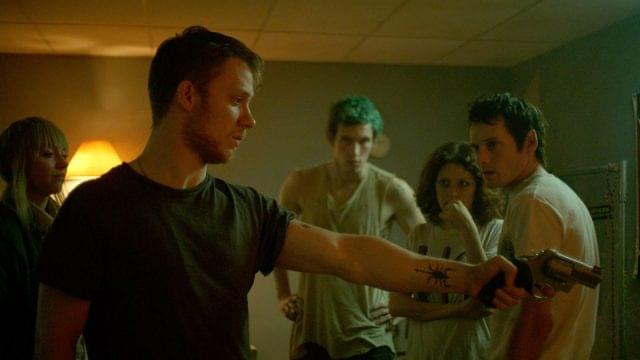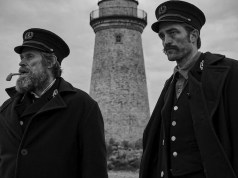
One of the occupational hazards of being a young, struggling punk band is that sometimes the roadhouse where you’ve booked a gig turns out to be a den of Nazi skinheads. “Green Room” starts with that uncomfortable arrangement (“Don’t talk politics,” advises the guy who set it up) and descends from there into expertly crafted cold-sweat terror. The first time I saw it, I hardly breathed. The second time I saw it, I was alarmed to discover that already knowing what was going to happen didn’t help.
It’s from writer-director Jeremy Saulnier, whose contemplative revenge drama “Blue Ruin” was more of a simmering boil than this intense, explosive nightmare. Though it’s primarily a siege scenario — the band members barricade themselves in the venue’s dressing room after witnessing something the skinheads wish they hadn’t — the story goes in more directions (figuratively and geographically) than you’d expect, and Saulnier never lets it get stagnant. Every time the film seems on the verge of getting repetitive or claustrophobic, there’s a new development.
It helps that the plot doesn’t depend on anyone being an idiot. The band, called the Ain’t Rights, comprises four college-age kids — Pat (Anton Yelchin), Sam (Alia Shawkat), Reece (Joe Cole), and Tiger (Callum Turner) — who exhibit the usual youthful naiveté and punk-rock recklessness. They’re very serious about the purity of their art, like experienced adults might be; but they also siphon gas from parked cars when they don’t have enough money to fill up their van, like dumb kids might do. Yet in a crisis, they react rationally, almost always doing what we (from our safe, objective vantage point) figure we would have done, too.
Unnervingly, the bad guys are just as rational. The owner of the venue and leader of the white supremacists is a sensible businessman who pays his taxes and enforces the fire codes. His name is Darcy, and he’s played by Patrick Stewart, a model of pragmatism. (One of the occupational hazards of being a bald white actor is that at some point you’ll be hired to play a skinhead.) With his sonorous, authoritative voice, Darcy calls to the Ain’t Rights in the green room from out in the corridor, pleading for a peaceful resolution to the standoff, which has one of his bouncers, Big Justin (Eric Edelstein), locked in with them. Amber (Imogen Poots), a club regular who witnessed the same bad thing the band saw, is also involved. The band just wants to leave; understandably, they don’t trust Darcy when he says his squad of jackbooted thugs doesn’t want to “silence” them.
I spoil nothing when I say that violence ensues. BOY, DOES IT. It’s brutal, but it’s not constant or gratuitous. (My hunch: people will remember the film having more acts of onscreen violence than it actually does.) One of Saulnier’s savviest touches, in fact, is creating a scarcity of guns and ammo, forcing everyone on both sides of the battle to get resourceful. This can lead to symbolic choices like the skinheads sending in pit bulls (which, like people, are only hateful and vicious if they’re taught to be), and the Ain’t Rights repelling them with amplifier feedback — music as a weapon, a literal manifestation of the essence of punk rock. The kids’ other strategies vary in effectiveness, and Saulnier exploits their fear and panic to great effect. He shows us the skinheads’ machinations, too, giving us information that the band doesn’t have so that we can see the level of organization involved and tremble accordingly.
My only real issue with the film is one that you’d think would be an asset: Patrick Stewart. As great an actor as he is, I just don’t buy him as a murderous white supremacist. He’s too upright, too decent — especially that comforting, paternal voice of his — to be menacing, or at least this kind of menacing. (I can’t help but think Darcy’s one late-in-the-game use of the N-word is only there to keep us from forgetting that, oh yeah, this guy is evil.)
But that’s a relatively minor issue. The story doesn’t need a strong, singular bad guy; the “villain” is the situation itself, where innocents stumble into a mess they’re ill-equipped to handle. The young cast is uniformly good (including Mark Webber and Saulnier regular Macon Blair as low-level skinheads), with everyone traumatized and terrorized in believable ways. They aren’t pathetic slasher victims, but they aren’t superheroes, either. Whoever makes it out alive is going to play some seriously haunted punk rock from now on.
A- (1 hr., 34 min.; )





